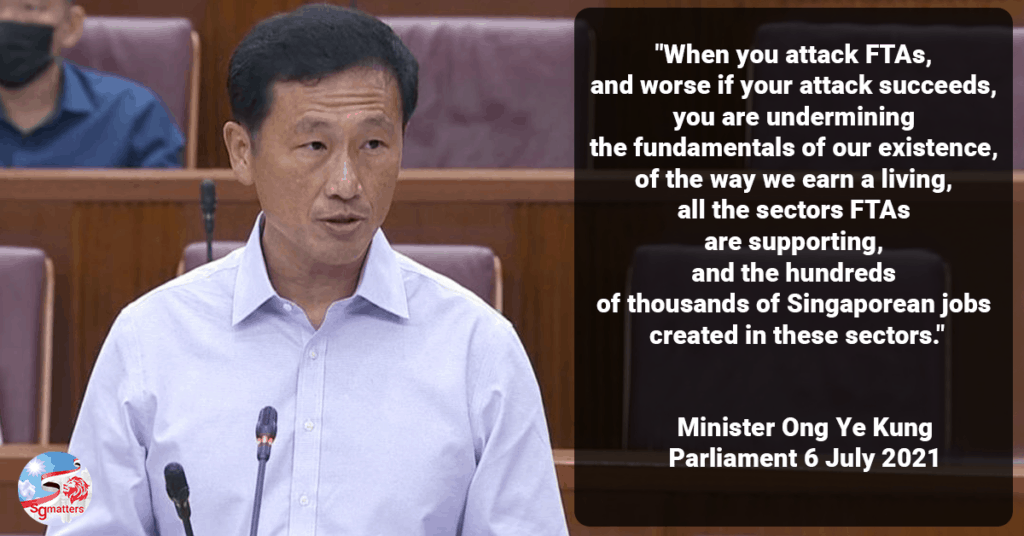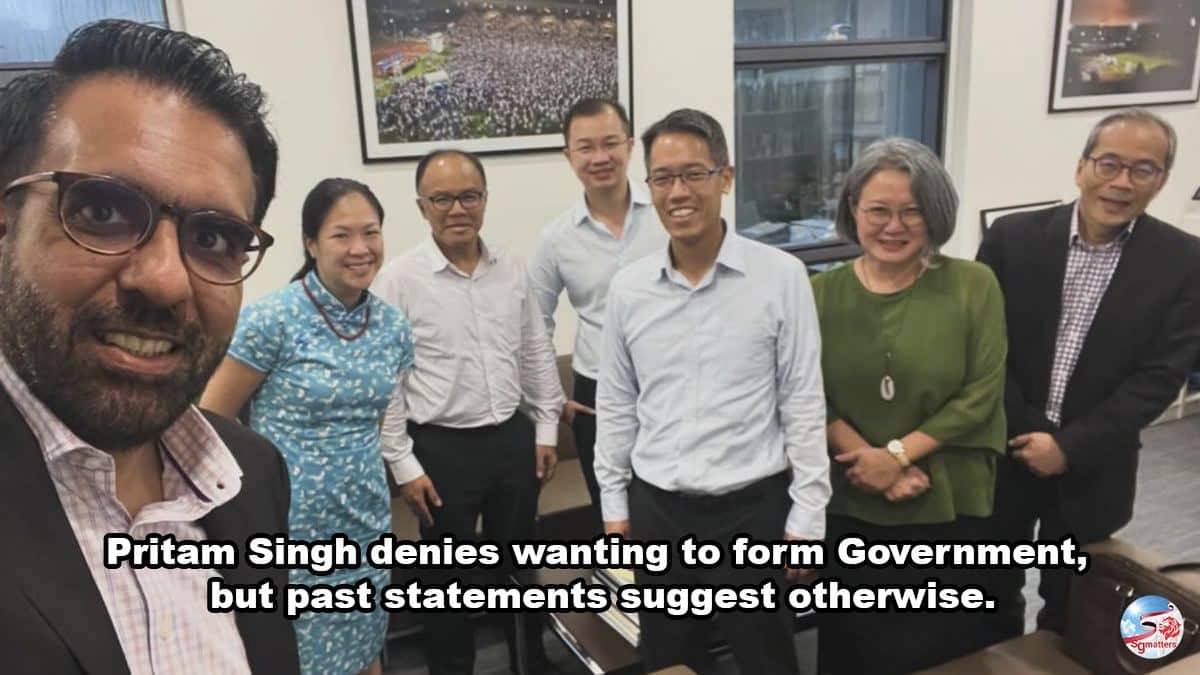“FTAs and CECA have been made political scapegoats, to discredit the policy of the PAP Government,” Minister Ong Ye Kung said in Parliament 6 July 2021.
In his ministerial statement Mr Ong said FTAs in general, and CECA in particular, are not the cause of the challenges our PMEs face delivered. If anything, they are part of the solution.
What is fundamental to our economic survival?
“Simply put, we are too small to survive on our own, and we need to tap into global markets to earn a living, and be self-reliant,” Mr Ong said.

“If we accept the basic reality that Singapore needs the world to earn a living, then we would realise the fundamental importance of all our FTAs. They are a keystone of the economic super-structure we have built. We could not have advanced the welfare of Singaporeans to the degree we have without FTAs.”
Mr Ong explained that our FTA strategy began in the late 1990s. We executed this strategy before other countries did and it had boosted our efforts to export, attract investments, venture overseas, and create good jobs for Singaporeans.
“Today, when EDB goes out and persuades investors to come to Singapore, our network of FTAs is always a major selling point,” Mr Ong said.
Our FTAs are especially important to our SMEs because they free them from being constrained by our small domestic market, and give them access to global markets. Today, our SMEs are sending all kinds of Singapore-made products overseas, from canned food, barbecued pork and frozen roti prata to medical devices, machines, components and chemicals.
When you attack FTAs, you undermine the fundamentals of our existence.
“When you attack FTAs, and worse if your attack succeeds, you are undermining the fundamentals of our existence, of the way we earn a living, all the sectors FTAs are supporting, and the hundreds of thousands of Singaporean jobs created in these sectors.”
CECA and trade with India
By reducing tariff barriers, CECA makes Singapore goods more competitive in the Indian market. Since CECA came into force, bilateral trade between Singapore and India has grown by over 80%, from S$20 billion in 2005 to S$38 billion in 2019. During the same period, Singapore’s direct investment abroad in India grew by nearly 50 times, from S$1.3 billion to S$61 billion.
In 2019, 660 companies from Singapore have investments in India, almost double the number (nearly 370) a decade ago. As these companies grow regionally, they hire more people back
home too. In 2019, they employed 97,000 locals.
Free movement of natural persons? Not!
Immigration matters are set out in Chapter 9 of CECA – Movement of Natural Persons. The legal text is available online.
Mr Ong pointed out that the chapter makes it clear that the Government’s ability to regulate immigration and foreign manpower is not affected by the Agreement. “The Government retains full rights to decide who can enter the country to live, work or become PRs or citizens,” he emphasized. This is set out clearly in two clauses. They are the second and third paragraphs of Chapter 9 of CECA, Mr Ong said.

“Mr Speaker Sir, I emphasise and underline and highlight this: nothing in the agreement implies Singapore must unconditionally let in PMEs from India. Contrary to PSP’s claim, our ability to impose requirements for immigration and work pass, has never been in question in CECA or any other FTA that we have signed.”
The list of 127 professions confers free pass to Indian nationals? Not!
The listing shows the types of Indian professionals who may apply to work in Singapore. It does not mean we must approve them, Mr Ong said. All foreign PMEs – Indian PMEs included – have to meet our work pass conditions in order to work here. Intra-corporate transferees also have to meet our work pass qualifying criteria.
The total number of intra-corporate transferees, from all over the world and not just India, that have come to Singapore to work is very small. In 2020, there were only about 500 intra-corporate transferees from India in Singapore – less than 0.3% of all EP holders.
“As a city state connected to the world, we want to welcome diverse talent from all over the world,” Mr Ong said.
“We must not inadvertently shake the bedrock that has enabled Singapore to succeed. We cannot survive – we cannot earn a living – without being connected to the world, and without being welcoming to the world, without the House unanimously supporting the FTA strategy.”
[irp posts=”9188″ name=”PM Lee: Our network of FTAs has benefited us enormously.”]





